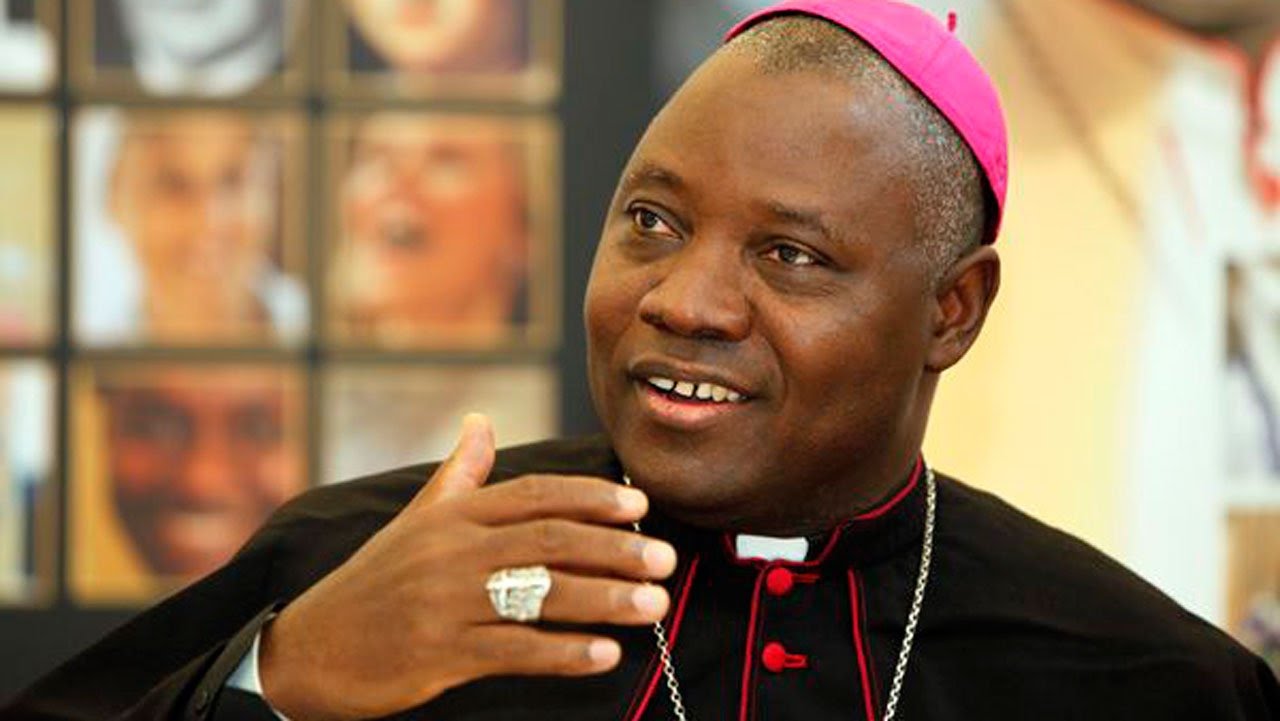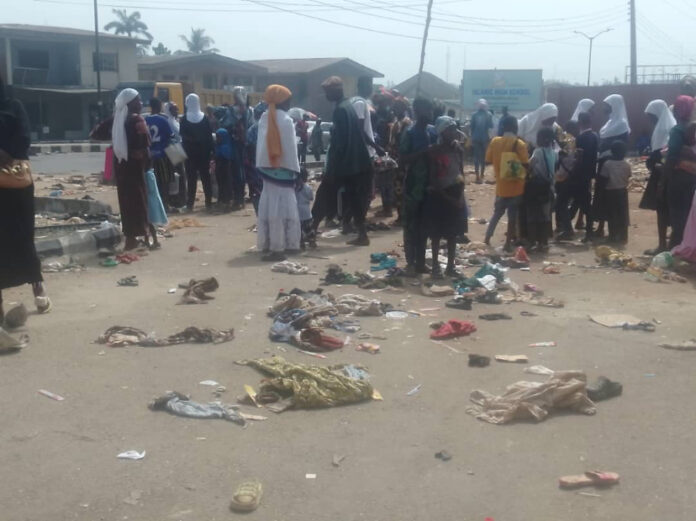Leading presidential aspirant on the platform of the Peoples Democratic Party, Atiku Abubakar, has said he will do only one term if elected as President in 2019; he said this while responding to questions among others issues he addressed with THISDAY Newspaper.
Excerpts below:
You officially joined the race for the PDP ticket ahead of the 2019 presidential election two weeks ago. What exactly is your agenda for Nigeria?
My agenda is centred on jobs. That is what I have been doing for the past 40 years. I am first and foremost an entrepreneur. A job creator. My group of companies has a workforce of about 50,000. This does not include the hundreds of thousands that are indirectly employed. I believe in creating jobs, providing opportunities, being united as one Nigeria, and securing it all with a military-industrial complex whose raison d’être is ‘Nigeria First.’
It is a fact of life that you cannot give what you do not have. In December of 2017, the government-owned and operated National Bureau of Statistics officially revealed that 7.9 million Nigerians had lost their jobs in the 21 months immediately preceding the Buhari government. The current government cannot create jobs because it is headed and peopled by men and women who have never run successful businesses. They ran their own private businesses down. So how can you expect them to run the public’s business up? What I am assuring Nigerians is that if they elect me, I promise them that everyone who wants to work will be given opportunities.
Even this thing they are doing, called N-Power, is a product of their poverty mindset. Nigerians do not need handout. Nigerians need a leg up! Our people are not lazy. Quote me anywhere; Nigerians are the most intelligent people on God’s planet. The reason our people are living in poverty today is that our current leaders have a poverty mentality. I will give you a very good example. How can I be president and criminals will attack my people and I will tell them that the only thing I can do is pray? Then, in that case, I should be a clergyman, not a president! How can a leader open his mouth and tell his citizens that it is better to give land than to die? That is as good as telling the people that they have been conquered.
What do you think puts you shoulder above other aspirants and more so, the current president?
The number one problem facing Nigerians today is not insecurity. It is not corruption. It is not even lack of power. The most pressing problem in Nigeria today is unemployment. We have more unemployed people in Nigeria today than the combined population of the Republics of Benin and Togo multiplied by two. Two months ago, Nigeria overtook India as the world’s headquarters for extreme poverty. Not poverty, mind you, but extreme poverty. That is the highest level of poverty. It is almost as if I was born for this challenge. You may even say that the challenge is tailor-made for the unique abilities that God has given me. Atiku means Jobs.
President Buhari can’t say that. In fact, under him, the situation has deteriorated so badly. None of the other aspirants can say the same thing. Most of them have spent their entire lives being either employees of the government or employees in the private sector, which in itself is not a bad thing. However, I have created more jobs than any other person in the race.
Let me ask you a question: If you are at an airport with your private plane and you notice that the weather conditions are bad, would you go with a pilot who tells you, ‘I know how to pilot a plane’ Or, will you go with one who tells you, ‘I have piloted a plane in bad weather and here is the proof?’ The current Nigerian economic climate can be likened to bad weather. Even the government cannot pay salaries. Even the government is not employing. Yet, with all that they have done to make things difficult for me, I am still employing. I am still paying salaries.
I recently brought the Chicken Cottage franchise to Nigeria and created hundreds of new jobs. I am currently building a hospital in Abuja with the Saudi-German Hospital. Just the construction and planning alone is already providing jobs. Imagine how many jobs it will provide when it is completed. Not to mention the huge impact it will have in making healthcare accessible and affordable for Nigerians.
You have become the champion of restructuring even more than Bola Tinubu, who no longer speaks of it. President Buhari described those clamouring for restructuring as parochial. What is your reaction to that? In addition, how do you really plan to restructure the country if elected in 2019?
With all due respect, it is the refusal to even discuss restructuring that is parochial. Nigeria either restructures or it withers away. And the sad thing is that the man who made that comment does not even know the meaning of the word parochial. To be parochial is to have a limited mindset incapable of seeing reason with others. Now, who is parochial between him and those advocating restructuring?
Take something like insecurity. The other day there were killings in Plateau State and the President said the situation had got so bad there was nothing more he could do than pray. Even that statement itself is a cry for restructuring. The man is admitting that there is nothing he can do, within the current structure, other than to pray. That means the current structure, by his own admission, is not working.
If we restructured and had community policing, the man would not be in such dire straits. The Imam of Nghar village, in Barkin Ladi Local Government Area of Plateau State saved 300 Christians by hiding them in his mosque during the recent crisis. By that singular act, Alhaji Abdullahi Abubakar saved 300 lives. That was a community solution to a community challenge. Now put your thinking cap on. Imagine how much safer that community would be if they practised community policing, which relied on community leaders like Imam Abdullahi Abubakar?
Even in revenue generation, I came up with the idea of matching grants when I gave a speech at the Royal Institute of International Affairs, also known as Chatham House, on April 25, 2018. Matching grants would motivate our states to be less dependent on federal allocation and more dependent on internally generated revenue. Today, both the Federal Government and the states are broke. They depend on loans to even pay salaries and in the midst of that, someone is saying that we do not need restructuring. Reality departed from such a fellow a while ago!
How do I plan to restructure the country if elected? Restructuring is a process, not an event. However, I have said it that I would restructure Nigeria within six months of being elected. First of all, no state will get less than what they are currently getting from the federation account. In fact, they will get more. That is what my initiative of matching grant is all about. I only need a constitutional amendment if I want to take power and resources away. I do not need to amend the constitution to give power and resources away.
Let me give you an example. There are several federal government-owned assets and projects wasting away in Lagos and other states. I do not need a constitutional amendment to call the Lagos State government or governments of the other states and say take over these assets and projects and whatever monies they generate. I do not need a constitutional amendment to transfer universities from the Federal Government to the state government. I only need an Executive Order. Ditto for returning schools to the missions and religious organisations, which once owned them. The most vital part of restructuring is the devolution of powers, not the accumulation of powers and it is easier to give powers away than to take them from the federating units.
As you know, restructuring is not particularly popular among the northern elite. How are you going to convince them that this is the best way to realise Nigeria’s economic and human capital potentials?
That is a myth. Unfortunately, this presumption has discouraged many true proponents of restructuring. Those who perpetuate this falsehood are attempting to rewrite history. Let me tell you, when General Aguiyi Ironsi came up with the controversial Unification of Assets Decree No. 34 of 1966, it was not the West or Midwest that resisted it. It was not the East. It was the North that rejected it and for good reason. Northern Nigeria is capable of feeding not just the whole of Nigeria, but the whole of Africa. That was why the Sardauna was so happy with the discovery of oil in commercial quantities in the East. He was not threatened by it. He was overjoyed. His vision was that the North would grow more food that the other regions would be in a better position to buy. Is that not genius? Does that sound like someone who would be against restructuring?
Now coming back to the present time, even though Nigeria did not become the world football champions at the World Cup, I am so glad that our Russia 2018 World Cup Team was constituted the way it was. Ahmed Musa, a northerner, was the Most Valued Player on the Super Eagles squad. He delivered goals. Ahmed Musa has proved some people’s fears to be unfounded. Through his talents, he has demonstrated that there is no part of Nigeria that is without talents. He has shown that we can run our government and our civil service based on merit, instead of ethnicity and religion.
Just last week, the Joint Admissions and Matriculation Board revealed that the best overall scorer in this year’s Unified Tertiary Matriculation Examination came from Borno State. Borno State! Think about that!
Stereotypes are dying. Let us give them a proper burial and move on without them. There is support for restructuring nationwide and there is resistance to it countrywide. Let us not make northerners a convenient scapegoat just because Buhari, who does not want restructuring, is a northerner.
The entire educational system in the country has collapsed. We now produce fourth grade graduates. Nigerian universities are hardly among the top 500 universities in the world. Our public schools are in a sorry state because leaders like you have not done what you ought to have done. Now that you have broken with that class of leaders and you tell us that you want to solve the problem, tell us where you are going to start from and how you are going to do this?
Well, you can only hold me vicariously liable as a member of the political class, but you cannot hold me personally responsible because when our administration came into being in 1999 the situation was already bad. However, by 2007 when we left, we made it better than we met it. Our administration increased the salaries of teachers and lecturers. We committed a higher sectorial allocation to education than what was the norm before us. And when you look at what I have done in my personal capacity, you must admit that, perhaps, no other individual or group of individuals has committed the quantum of investments I have committed to education.
I did not found the American University of Nigeria, Yola, to make money. It is my biggest community development project. Chibok girls are there on scholarship. I was an indigent student. I was an orphan as a child. So I know what it is to struggle. As a result, the American University of Nigeria, Yola, has opened up its doors to those who would not ordinarily have been able to attend. If we want to fix education in Nigeria, we must do the same thing. We must commit to investing in education because no other investment yields a greater interest.
If I am elected as the president, I would sit with the heads of the legislature and the judiciary and appeal to their sense of nationalism. We must all reduce our recurrent expenditure so that we can collectively increase our investments in the education sector. The fastest way out of Third World status for any nation is by educating youths and women.
The whole purpose of the National Youth Service Corps was to improve national cohesion by involving Nigerian graduates in the development of the country. If I am elected as the president, all members of the National Youth Service Corps would have only three options on where to serve. You either teach, or you farm or you treat people in a hospital or clinic. No exception, even if you are my own biological child or grandchild.
If I am elected as the president, I will ensure that the education sector attracts the best brains by working with the states to achieve targeted salary increase for teachers and lecturers. You cannot have a local government councillor earning more money than a lecturer and expect our best brains to be attracted to the academia. I would change that.
I was shocked to find out that Nigerians spend a billion dollars to educate their children in Ghana every year. When you add the cost of educating their wards in Europe and America, you are looking at a further $1 billion. I am assuring you that if we invest in our education sector and make it as good as Ghana’s and definitely even better, that $2 billion will no longer leave Nigeria. It will circulate internally and boost the quality of our education and the value of our Naira.
Recently, you were said to have promised to devote 21 per cent of your national budget to education. Tell us, how you will do this because we actually need a concrete plan of action and specificity in this regard?
Yes, I did make that commitment and I make it here again. I pledge that if I am chosen by my party, the Peoples Democratic Party, to be its presidential candidate, and if I am subsequently elected as the President by Nigerians, I will go above and beyond the United Nations’ recommendations and ensure that a minimum of 21 per cent of the federal budget is devoted to education. Beyond that, I will reserve 10 per cent of that amount to further and continuous education for our public school teachers. Nigeria’s education sector must progress from creating job seekers. We must train our teachers to train our children to be job creators as well.
As for the specifics, for the last 10 years, Nigeria has budgeted the equivalent of $30 billion at the federal level, give or take. Twenty-one per cent of that is about $6.5 billion. I already mentioned to you that if elected as the president, I would sit with the heads of the legislature and the judiciary for the purpose of coming to an agreement on how we can scale down our overheads.
On the side of the executive, there are so many things we can cut down on. Recently, I wanted to go to Azerbaijan and I found out that they don’t have an embassy in Nigeria or any other country near Nigeria. To get a visa, you apply online to their foreign office.
Nigeria maintains literally hundreds of embassies and foreign missions in multiple nations that we really do not need. We can close down two-thirds of these missions and have one embassy service as many as four nations in the geographic vicinity. We can use technology to provide consular services.
In 2018, we budgeted N63 billion for recurrent expenditure in foreign affairs. Under an Atiku presidency, we would spend only a quarter of that. The rest will go to education.
In the same budget, we are spending N1 trillion paying salaries for our military and paramilitary officers and men, and less than half of that paying salaries in the education sector. As an educator, I see the problem immediately. The less you spend on education the more you have to spend on security. The more you spend on education the less you have to spend on security. It is interconnected. We are having to spend so much on defence because over the years we have not invested enough in education. Beginning from my first year, I will reverse that. The money will be re-channelled to education.
In the 2018 budget, we have N112 billion going to the Office of the Secretary to the Government of the Federation. To do what? Award grass cutter contracts? Under an Atiku administration, whoever is the Secretary to the Government of the Federation just has to find a way to manage 10 per cent of that money. The rest will go to education. I am serious about this. This is not rhetoric. I have achieved it in my private capacity as an educator and if given the chance, I will replicate it in Nigeria’s public sector.
Nigeria nationalised education in 1975 and that has been the root of the crisis in the education sector. How would you resolve that particular issue of centralised control of education that has destroyed the educational system? Would you allow states to have total control over education, limiting federal intervention to the barest level? And how would you use the increased budgetary allocation to education you have proposed to ensure our education is more relevant to the economic and scientific growth of the country?
I believe I answered the first part of your question when I said I would use Executive Orders to devolve some powers. To be more specific, by Executive Order, the President can hand over universities to the states in which they are located. By Executive Order, the President can also hand over all unity secondary schools to the states in which they are located. Where these schools were taken over by the Federal Government from religious bodies and missions, they should be returned to such religious bodies and missions.
As to the second part of your question, the bulk of the 21 per cent sectorial allocation will not go towards paying salaries, as is currently the case. Almost half will go towards infrastructure and capacity building. I will set up a fund for the compulsory training and continuous education of all Nigerian teachers. I will issue an Executive Order mandating that all Nigerian schools must be WiFi-equipped at federal government expense. We will work with the private sector to take in students as interns so that they can learn on the job during their holidays and the federal government will be responsible for paying these students a learning bursary.
Our research and development agencies will be retooled. They must deliver. How could the Buhari administration be considering importing grass from Brazil when we have research agencies like the Federal Institute of Industrial Research, Oshodi, and the non-government owned International Institute of Tropical Agriculture, Ibadan? I would order our research agencies to work with fully Nigerian-owned businesses, like Innoson Motors. Because of the immense successes we have had at the American University of Nigeria, Yola, I know that Nigeria as a whole can have similar successes.
Are you going to devolve responsibilities for education to the states? And how will you engender competition among the states to ensure that the educational system is merit-driven?
I already answered this question and in some detail too. As to the second part of your question, the federal government will retain ministries and agencies, like the ministry of education and the National Universities Commission and other agencies for other levels of education to ensure that minimal national standards are in force in institutions. As long as these institutions maintain these standards, the federal government will continue to intervene in those institutions through the initiatives I already outlined.
Some people are worried about your age. Many also say that you don’t have the cult-like followership that Buhari has, to be able to win the election. The belief is that even though you have national support, winning the presidential election is still going to be a tall order. What is your reaction to this?
How old am I versus the incumbent? I know when I was born. This is my exact age. I do not have a football age. But the issue is even beyond age. It is about fitness. I am fit. I am ready to publish my medical records and I challenge all those who are running, including the incumbent, to give that same assurance. As to the cult-like following, yes, you are right, I am not a cultist, nor will I ever be. The history of the human race has shown that personality cults do more harm than good. But if this cult is so powerful, how come it could not help elect Muhammadu Buhari in 2003, 2007 and 2011? How come Nasir el-Rufai, my former protégé, said on October 4, 2010 that Buhari is ‘perpetually unelectable’?
The truth, which you and I know, is that without the support of Bola Tinubu, Buhari would not have been elected as the President, his cult followership notwithstanding.
Some have also said that your chances of being president would be enhanced if you commit to only one term so that you will be the bridge between the old and the future. Would you commit to one term only?
Of course, I would! I have said this before on my own initiative. I believe in it. If I am elected as the President in 2019, I give an undertaking that I would only do one term.
Having said that, let me remind Nigerians that Buhari also gave such an undertaking in 2011, but he is not living up to it today. My own case will be different. I am prepared to sign an undertaking to do only one term.
Are you not just saying this to get the ticket and, ultimately, get elected after which you would feel no obligation to honour your words? But how do you make us believe you, since Buhari, as you have said, failed to honour his own 2011 pledge?
I am not Muhammadu Buhari. I do not make promises I cannot keep. I am assuring Nigerians that I will keep this promise. I am making it out here in the open. I am willing to sign a written document. If you or any other Nigerian can come up with an iron-clad legal document that binds me, I am willing to publicly commit to it.
Would you eliminate the State of Origin and replace it with the State of Birth to herald a new Nigeria?
I have said this publicly before now. And this is not a new thing. The first elected mayor of Enugu, Umaru Altine, was a Fulani resident of the coal city. On the 10th of November 1956, Altine was also elected the leader of his local branch of the NCNC without any opposition.
In fact, our constitution does not give prominence to this dichotomy. That is why my party, the PDP, fielded Oghene Egoh, from the South-south, and Rita Orji and Tony Nwolu from the South-east, as candidates for election into the House of Representatives, representing Lagos constituencies and the good thing is that they won. So, it is already happening, and if I am elected as the president, it will become an official government policy.
The APC has been mobilising to remove the Senate President and his deputy. How do you see a move like this by a party that benefitted from defections that it celebrated with fanfare a couple of years ago, which, of course, helped it to win the 2015 election?
Hypocrisy has always been the APC’s stock in trade. They claimed that the PDP mismanaged Nigeria for 16 years, yet in just three years of APC being in power, Nigeria experienced a recession, which we never experienced under the PDP. Nigeria’s currency became the fourth worst performing currency in the world and in just three years, they have taken more loans than the PDP took in 16 years. They claim the PDP was corrupt, yet Nigeria made its best showing in Transparency International’s annual Corruption Perception Index under the PDP in 2014 when we moved eight places forward, from 144 to 136. Meanwhile, under the so-called anti-corruption government of the APC, we made our worst performance ever, moving 12 places backwards, from 136 to 148.
They claim that the PDP lost the war on terror and they declared victory. But look at where we are today? Terror has spread nationwide and the man who said the PDP was weak on terror says there is nothing he can do but pray! So when you talk about hypocrisy and the APC, you are referring to two evil twins that are so identical that one can pass for the other.
How would you resolve the security challenge in the country – Boko Haram, ISIS, herdsmen, etc.? Many worries that the spate of killings threatens the very existence of the country. Why do you think it is so difficult for the government to protect lives and property?
It is all about leadership. Pure and simple. I have said it before that Nigeria has 150,000 policemen performing non-core police functions, chief of which is guarding VIPs. Do you know that Leah Sharibu’s father, Nathan, is a policeman? He is a member of the Nigerian Police Force’s Special Protection Unit. Just look at how we failed him and his family as a nation. At a time when he was protecting others, nobody was protecting his daughter’s school in Dapchi. How do you think he will feel?
My solution to the current insecurity in Nigeria is that I would commercialise the Special Protection Unit. Those 150,000 policemen will still guard VIPs and the private sector. But those VIPs and the private sector will have to pay for their services. From the money realised, we will recruit an additional 150,000 policemen and send them to security hot spots, thereby creating jobs by securing the nation.
It is all about priorities. The other day we had an election in Ekiti State and this administration mobilised 30,000 policemen there. Then two weeks later, the government proudly announced that they were sending a 1,000-strong force to tackle the scourge of banditry in Zamfara State. Under an Atiku presidency, this will not happen. Securing the lives of Nigerians would have priority over securing votes for my party.
You may like
-


Experts, Stakeholders Association React To Baseless and Unfounded Allegations Against GTCO
-


Bobrisky: FG Suspends Two Senior Prisons Officials Over Bribery Allegations
-


BREAKING: Akwa Ibom Gov Umo Eno Loses Wife
-


Police Move 76 Kano Suspects Arrested For Flying Russian Flag To Abuja, Plan Sedition Charges
-


Marketers Project N600/litre For Dangote Petrol
-


President Tinubu Should Have Political Will To Get Nigeria New Constitution —- Mike Ozekhome [VIDEO]
BIG STORY
Catholic Priest, Other Church Officials Arrested, Detained Over Abuja Palliative Stampede Deaths
Published
9 hours agoon
December 25, 2024
A senior Catholic priest in Nigeria’s Federal Capital Territory, Abuja, has been arrested over the tragic stampede that claimed 10 lives during the distribution of free food to the needy at “Holy Trinity Catholic Church, Maitama.”
It was gathered that a number of officials of the church involved in the planning and execution of the ill-fated charity event have also been arrested by security agents. All those arrested have been taken into detention and will likely spend Christmas behind bars, a top Catholic Church leader confirmed on Christmas Eve.
The arrests came against the background of demands by the Islamic activist group, “Muslim Rights Concern (MURIC),” for the arrest of those behind the event and a similar one in Okija, Anambra State, where 22 persons were confirmed dead in a billionaire businessman’s house. MURIC had demanded that organisers of a similar tragic charity event in Ibadan, Oyo State, who were taken to court and remanded in prison custody, should be released if those of the Abuja and Anambra events would not be given similar treatment.
Inspector General of Police, Dr. Kayode Egbetokun, had also ordered an investigation into the Abuja and Anambra tragic charity outreaches.
Reacting to the arrest and detention of his church officials, the Catholic Archbishop of Abuja Diocese, Most Rev. Ignatius Kaigama, last night condemned what he described as “verbal demonization of the Catholic Church” by some agents of government in responding to the tragedy at “Holy Trinity Catholic Church in Maitama.”
According to Kaigama, the detention of the priest as well as some officials of the church and the threat to slam criminal charges on the church “is to say the least, uninspiring, unfriendly and a misplaced zeal, and one wonders what purpose these were meant to serve.”
Archbishop Kaigama, who made his mind known in his Message titled, “Christmas: A Season of Hope and Renewal,” said that government officials should have focused on helping the organisers and the church to overcome their trauma instead of compounding it through arrest, detention, and threat of criminal prosecution.
BIG STORY
Thousands Flock To Lagos For Africa’s Biggest Shopping, Entertainment Event [PHOTOS]
Published
1 day agoon
December 24, 2024
Thousands of excited Nigerians attended the opening day of the much-anticipated maiden edition of the Lagos Shopping Festival (LSF) on Monday, December 23 and were served up an electrifying feast of events, activities and promotions across the the main venue of the festival, the iconic Mobolaji Johnson Arena, (formerly Onikan Stadium).
As advertised, first day of the festival lived up to its billing with a colourful blend of commerce, music, innovation and creativity following its flag off by the Executive Governor of Lagos State, Babajide Olusola Sanwo-Olu.
The Lagos Shopping Festival, powered by the Lagos State Government in collaboration with Chain Reactions Africa, a frontline PR firm, and supported by leading brands, including Zenith Bank, Tolaram Group, First Bank Plc, and Guinness, will see millions of people hit the main venue and select Lagos malls to bag the latest bargains, and bring together the best of city’s retail offering, showcasing local and top global brands and shopping experiences, including in-mall promotions.
Speaking at the event, Governor Sanwo-Olu described the LSF as a history-making festival of back-to-back shopping, fun, and entertainment, reaffirming the Lagos state’s commitment to grow small businesses as well as the entertainment industry.
“This is the first of its kind and this event is made to bring shoppers with MSMEs, with innovators, with entertainers, with the creative industry, with the food industry and everybody,” said Sanwo-Olu.
“For the next three days, we are meant to all come together, enjoy good food, good music, sales at discounted market price, shopping at the highest level and just general entertainment with the creativity of Lagos,” the Governor added.
He called on all Lagosians and Nigerian to join the fun, shopping and entertainment.
“Call everybody from Iyana-Ipaja to Alimosho, call people from Agege, call them from Ebute-Meta to Shomolu, call them from Bariga, from Badagry to Ikorodu, from Epe to Ibeju-Lekki, call everyone to come to the arena here at the Mobolaji Johson Center in Onikan where we’ll be doing shopping, we’ll be doing music, we’ll be doing entertainment for the next two days. This is the first of its kind”, Sanwo-Olu added.
He assured all fun-seekers, buyers and sellers of their safety, saying that they are in a safe, secure, peaceful environment, urging them to “to sit back, relax and see another Lagos creativity that is the first, and the very first Lagos Shopping Festival”.
Governor Sanwo-Olu expressed his appreciation to the sponsors of the Lagos Shopping Festival for their unwavering support to drive the story of Lagos commerce, entertainment and creativity.
“I want to thank all of our sponsors from FirstBank, to Zenith Bank, to Tolaram, to Smirnoff Ice, to Indomie Noodles, to OmniBiz, to PowerOil, to Minimie, and to Malta Guinness, all of them, including the Lagos State Government. I want to thank you”.
He also commended all the local and small businesses at the festival, and urged Lagosians and Nigerians to always patronize them.
“More importantly, to all the small businesses that are inside and under the canopies, go out there and make good deals. Go out there and do huge purchases from them. Go out there and make their small-scale market, work for them; because here, we want the market to be meeting all of the shoppers. That’s what this is all about. It’s about buying stuff at the most reduced market. It’s about entertainment, it’s about food, it’s about tourism. This is what Lagos has given to you again,” Sanwo-Olu said.
Also, commenting, the MD/ Chief Strategist, Chain Reactions Africa, the organisers of the Lagos Shopping Festival, Mr Israel Jaiye Opayemi, buttressed the strategic significance of the festival saying, “LSF is poised to be the catalyst that will redefine the true essence of commerce, especially SME businesses, the creative ecosystem, and fun times with family, friends and loved one. LSF is sure set to open a new vista of socio-economic growth from Lagos, to Nigeria, whilst raising a unique bar in the African market”.
Fun-seekers and business men and women alike had entertainment value for their time, with dancing and singing competition with the winners adjudged by the audience receiving cash gifts. The highlight of the day was the energy-revving musical performances from the youthful Ayo Maff, with the soulful rendition of songs from Adekunle Gold the icing on the cake for the audience who kept singing along to his enchanting stage performances.



BIG STORY
JUST IN: Oriyomi Hamzat, Queen Naomi, School Principal Remanded In Agodi Prison Over Ibadan Stampede
Published
1 day agoon
December 24, 2024
The Chief Magistrate Court sitting in Iyaganku, Ibadan, Oyo State has ordered the remand of Prophetess Naomi Silekunola, Alhaji Oriyomi Hamzat, and Mr. Abdullahi Fasasi at Agodi Correctional Center following their roles in the Ibadan Children Funfair stampede last week.
Amid heavy security, the three individuals, including the principal of Islamic High School, Bashorun Ibadan, Mr. Fasasi; the proprietor of Agidigbo FM, Alhaji Hamzat; and the estranged wife of the Ooni of Ile Ife, Oba Enitan Adeyeye Ogunwusi, Naomi Silekunola, were on Tuesday arraigned before the court over the incident.
The trio were arrested in connection with the Wednesday, December 18, 2024, stampede that occurred at Islamic High School, Ibadan, resulting in the death of 35 minors, while others sustained injuries.
Chief Magistrate Olabisi Ogunkanmi gave the order following the arraignment of the suspects in court on Tuesday.
The Police prosecutor accused the defendants of committing an offense contrary to Section 324 of the Criminal Code, Cap. 38, Vol. II, Laws of Oyo State of Nigeria, 2000 in a four-count charge for which they were arraigned.
The court premises was filled with relatives of the defendants and other interested parties.
More to come…
Most Popular
-

 BIG STORY2 days ago
BIG STORY2 days agoDeji Ogunsakin Launches The Better Life Foundation, Donates Food And Cash Gifts To Widows In Ado-Ekiti
-

 BIG STORY1 day ago
BIG STORY1 day agoJUST IN: Oriyomi Hamzat, Queen Naomi, School Principal Remanded In Agodi Prison Over Ibadan Stampede
-

 BIG STORY4 days ago
BIG STORY4 days ago10 Feared Dead, Several Others Injured At Catholic Church’s Palliative In Abuja
-

 BIG STORY2 days ago
BIG STORY2 days agoTinubu To Hold First Presidential Media Chat Tonight
-

 BIG STORY3 days ago
BIG STORY3 days agoFederal Government Declares Public Holiday For Christmas, New Year Celebrations
-

 BIG STORY4 days ago
BIG STORY4 days agoNNPC Denies Misleading Report, Insists Port Harcourt Refinery Operational
-

 BIG STORY3 days ago
BIG STORY3 days agoTinubu’s 50% Transport Reduction Scheme May Begin Tuesday
-

 BIG STORY3 days ago
BIG STORY3 days agoPetrol To Sell At N935 Per Litre From Today — IPMAN






